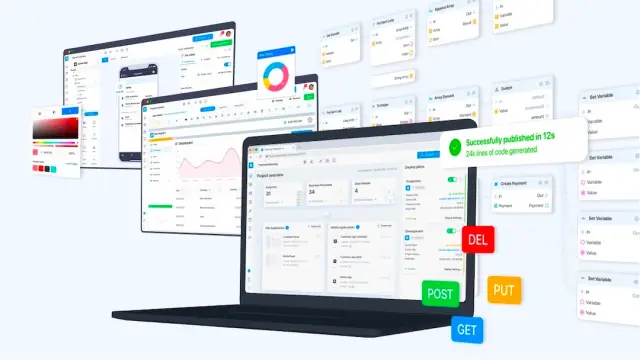Steering Clear of 9 Common and Costly Mobile App Budgeting Mistakes
Avoid pitfalls and ensure your mobile app's development's success by learning about and steering clear of nine common and costly budgeting mistakes.

The Importance of Proper Mobile App Budgeting
Mobile app development is a complex undertaking that requires careful planning and effective budgeting. In today's fast-paced, competitive market, a successful mobile app can be a game-changer for businesses. However, creating a mobile app that stands out among millions of available apps requires avoiding costly mistakes during the budgeting phase. In this article, we will explore the importance of proper mobile app budgeting and highlight common pitfalls that can lead to delayed timelines, unexpected expenses, and other adverse outcomes.
A well-planned budget ensures that the app development process remains on track, enabling effective resource allocation, providing a clear focus on priorities, keeping costs under control, and ultimately, contributing to the app's success in the market. However, many organizations fall victim to common budgeting mistakes that can lead to wasted resources, delays, or even project failure. By understanding and steering clear of these pitfalls, you increase the likelihood of launching a successful mobile app.
Mistake #1: Insufficient Market Research
The first common mobile app budgeting mistake is skipping or underestimating the importance of market research. Thorough market research allows you to identify your target audience, understand their needs, evaluate competition, and discover opportunities for your mobile app to stand out. Without proper market research, you risk creating an app that doesn't resonate with users, leading to poor adoption, a lack of revenue, and wasted resources.
Although market research can be time-consuming and sometimes costly, it is an essential part of the app development process. To avoid making a mistake, allocate adequate funds and time for extensive market research. Understand your target audience and their preferences, analyze competing apps to understand their strengths and weaknesses, and validate your app idea with potential users through surveys, interviews, or focus groups. With data-driven insights, you can build a unique, value-adding mobile app that meets user needs and surpasses competitors.
Mistake #2: Overlooking Hidden Costs
Another common budgeting mistake occurs when hidden costs are overlooked in the planning stages. Hidden costs are expenses that are not immediately obvious or easily attributable at first glance. In the context of mobile app development, these can include server hosting, third-party API integration, cross-platform compatibility, ongoing license fees for software and libraries, and even marketing expenses.

To avoid underestimating your app's total development cost, carefully analyze every aspect of the app development process and account for potential hidden costs. Enlist the help of an experienced development team, as they can better anticipate and manage hidden costs based on their past experiences.
Always include a buffer in your budget for unforeseen expenses that may arise during the development process. Remember, your app does not magically appear in users' hands. Plan for the cost of growing your user base through marketing and other engagement activities to ensure a successful launch and sustainable growth.
Mistake #3: Failing to Allocate Budget for Post-Launch Activities
Post-launch activities are equally as critical as the development process itself, but they're often overlooked when budgeting for a mobile app. Remember that the app's success isn't guaranteed once it hits the market; there's still a lot of work to be done. From marketing and advertising to user support and ongoing updates, neglecting post-launch activities can lead to poor app performance and even failure.
Some essential post-launch elements to consider when budgeting include:
Marketing and promotion
A well-executed marketing plan is crucial to ensuring your app reaches and engages its target audience. Allocate a sufficient budget for advertising campaigns, social media promotion, email marketing, content creation, in-app advertising, and other promotional efforts.
User support
Providing a user-friendly experience also means offering timely support to users who encounter issues. Invest in a customer support team or chatbot solution to address user concerns, as this contributes significantly to user satisfaction and positive app reviews.
Updates and new features
Apps require regular updates to fix bugs, improve performance, and maintain compatibility with the latest operating system versions. Additionally, introducing new features keeps the app relevant and appealing to users, encouraging continued engagement and growth.
Analytics
Tracking app performance and user behavior through analytics tools help you make data-driven decisions on app improvements and marketing strategies. Depending on the analytics tool you choose, costs may vary, so be sure to allocate a portion of the budget for this essential component.
By allocating funds for post-launch activities, you'll be better equipped to maintain your app's relevance and ensure its long-term success in the competitive mobile app market.
Mistake #4: Neglecting to Plan for App Maintenance
Allocating a budget for mobile app maintenance may not seem significant during the development phase, but it's an essential aspect of the app's long-term success. Maintenance is an investment in your app's future, as it's necessary to stay compatible with ever-evolving technology and user expectations. A well-maintained app performs better, receives fewer negative reviews, and retains users for more extended periods.
When budgeting for app maintenance, consider costs related to:
- Technical support: Software issues and bugs are inevitable, regardless of how well you've tested the app. Plan for regular app updates as part of maintenance costs, and assign a dedicated support team to address arising issues promptly.
- Operating system updates: iOS and Android platforms routinely release updates, and your app should stay compatible with these changes. Budget for regular updates to ensure uninterrupted app performance and user satisfaction.
- Third-party services: If your app relies on third-party plugins or services, factor in the costs related to upgrading or replacing outdated services.
- Server maintenance: Proper server maintenance, such as updates, backups, and security measures, is essential for an app's smooth operation, and its costs must be included in the overall maintenance budget.
Addressing maintenance costs early on in the budgeting process will help you avoid unexpected expenses down the line and contribute to a more successful mobile app.
Mistake #5: Not Prioritizing Security
In today's digitally connected world, security is paramount for mobile apps, and neglecting it can lead to severe consequences. A data breach can result in legal issues, damage to the app's reputation, and the loss of user trust — consequences that can impact your app's success and incur extensive financial losses.
To prevent security-related issues, allocate a significant portion of your mobile app development budget to:
- Security audits: Perform regular audits of the app's security measures to identify and address vulnerabilities.
- Encryption: Safeguard all data exchanged between the app and servers, as well as user data, using strong encryption methods.
- Authentication and access control: Provide secure authentication methods, such as multi-factor authentication, to protect user accounts and control who has access to sensitive data.
- Third-party services: Assess security practices and regulations governing the third-party services integrated into your app to minimize the risk of data breaches.
- Backend security: Ensure that secure communication channels are in place between the app and its backend services, and apply rigorous security measures to backend infrastructure to safeguard user data.
By prioritizing security in your mobile app-budget, you send a strong message to users that their data is secure, which builds trust and contributes to the app's long-term success.
When planning your app's budget, consider using powerful no-code platforms like AppMaster.io to streamline the development process and scale cost-effectively without compromising security. AppMaster offers powerful security features and helps you avoid many of the pitfalls described in this article by equipping you with the tools to create professional-grade mobile applications at a fraction of the cost.

Mistake #6: Ignoring Scalability
One of the most significant mistakes made during mobile app budgeting is not taking scalability into account. Scalability is the ability of your app to handle increased workloads and user numbers while maintaining its performance. As your user base grows, you'll need to ensure your app can support the added usage, new features, and additional integrations to adapt to the market's evolving demands. Ignoring scalability can lead to a disappointing user experience and may necessitate costly rewrites or even an entire application rebuild.
To avoid this pitfall, make scalability considerations an essential part of your app budget. Allocate funds for:
Server capacity
As your app's user base grows, so does the demand on your servers. Adequate server capacity ensures a smooth app experience for all users, prevents crashes, and keeps response times low. Plan for upgrades to your cloud hosting or on-premises server infrastructure when needed.
Code architecture
Ensure your mobile app's code is modular and well-organized for scalability. A poorly-coded app can become unstable as it grows, leading to bugs and crashes. Invest in a knowledgeable development team that understands the importance of clean, maintainable code for app longevity.
Monitoring and analytics
Closely monitor your app's performance in real-time and delve into analytics to identify potential scaling issues proactively. Allocate budget for monitoring tools and make informed decisions based on app usage patterns.
Continuous improvement
Apps need to evolve to stay relevant and meet users' changing needs. This means continuously enhancing features, optimizing performance, and refining the user interface. Don't cut corners in this area, as skimping on continuous improvement can lead to an outdated app that struggles to compete in the market.
By factoring scalability into your mobile app budget, you set a solid foundation for the app's long-term success and give yourself the flexibility to respond to new opportunities and challenges.
Mistake #7: Inadequate Variety of Testing
Mobile app testing should never be considered an afterthought. It plays a crucial role in ensuring your app meets user expectations and performs well in real-world scenarios. Unfortunately, inadequate or poorly planned testing is a common budgeting mistake that can turn into a costly problem when issues surface after launch. When planning your app budget, allocate sufficient time and resources to include a variety of testing types. Here are a few essential testing approaches:
- Functional testing: Confirms that your app functions as intended, according to your specifications and requirements.
- Compatibility testing: Assesses your app's performance and usability across different devices, operating systems, and screen resolutions.
- Performance testing: Measures your app's response times, load capacity, and ability to handle increasing workloads.
- Security testing: Ensures your app isn't vulnerable to threats and safeguards sensitive user data.
- User acceptance testing (UAT): Validates that your app effectively meets user needs and expectations, playing a crucial role in achieving customer satisfaction.
By allocating an appropriate budget for comprehensive testing, you minimize the risk of unforeseen issues arising after your app's launch, ensure a smoother user experience, and build trust with your user base.
Mistake #8: Poor Monetization Strategy
Mobile app monetization is a critical aspect of app success, ensuring your app is profitable and sustainable. One of the most frequent budgeting mistakes is not dedicating enough resources and time to strategize and implement a sound monetization plan. A poorly executed monetization strategy can lead to low revenue generation and even negative impacts on user experience and retention. To avoid this mistake, plan a budget for:
- Market and competitor analysis: Understand your target market and analyze the monetization strategies of successful apps in a similar niche. This information provides valuable insights to help you formulate an effective monetization approach.
- User experience considerations: Ensure your monetization strategy doesn't compromise the overall user experience. For instance, poorly placed ads can frustrate users, while unrealistic in-app purchase requirements may discourage people from using your app further.
- Multiple monetization models: Consider incorporating a variety of revenue streams into your app, such as in-app advertising, in-app purchases, premium subscriptions, or affiliate marketing. Diversifying revenue sources can boost your app's profitability and mitigate risks associated with relying solely on one model.
- Iteration and optimization: Monetization strategies should be continuously evaluated and optimized to maximize revenue. Allocate budget for ongoing analysis and refinements of your strategy, making data-driven decisions to increase your app's income potential. A well-planned mobile app monetization strategy ensures your app generates revenue, remains sustainable, and offers value to users.
By incorporating monetization considerations into your app budget, you pave the way for long-term success and profitability.
Mistake #9: Choosing the Wrong Development Approach
Selecting the appropriate development approach for your mobile app is crucial to its success and can significantly impact your project's budget. Broadly, there are three primary development approaches: native, hybrid, and web. Each has its advantages and drawbacks, and they cater to specific app requirements and target audiences. Here's a brief overview of each approach:
Native apps are developed explicitly for a specific platform, such as Android or iOS, using platform-specific languages and tools like Kotlin/Swift for iOS and Java for Android. Although native apps offer superior performance, offline functionality, and a smooth user experience, they can be costly to develop and maintain due to separate codebases for each platform.
Hybrid apps, on the other hand, leverage web technologies such as HTML, CSS, and JavaScript. They are then wrapped in a native container, enabling the apps to run on both Android and iOS platforms from a single codebase. Hybrid apps help save time and reduce costs during development but may suffer from lower performance compared to native apps.
Web apps are essentially websites optimized to run on mobile devices through a browser. While web apps are quicker and less expensive to develop, they have limited functionality and can't take full advantage of native APIs and device features. To avoid costly mistakes, it's vital to analyze your app's requirements and target audience and then choose an appropriate development approach accordingly. Consider factors like desired functionality, compatibility, device features, and long-term maintenance costs when making your decision.
Conclusion: Achieving a Successful Mobile App with Proper Budgeting
Accurate mobile app budgeting is essential to ensure your app's development runs smoothly and remains cost-effective. Avoiding the nine common budgeting mistakes discussed above can help protect your app from late-stage changes, unexpected costs, underperformance, and security vulnerabilities.
Proper budgeting enables you to focus on creating a high-quality app that meets user expectations, stays relevant in the market, and outperforms competitors. Throughout the development journey, revisit your budget regularly to track progress and control expenses. Ultimately, thorough budgeting empowers you to create a successful mobile app that satisfies users and generates a return on your investment.
How AppMaster.io Can Help You Avoid These Budgeting Mistakes
AppMaster.io is a powerful no-code platform that enables users to create comprehensive mobile, web, and backend applications without needing extensive coding knowledge. By harnessing the power of AppMaster.io, you can minimize and avoid costly mobile app budgeting mistakes. Here's how AppMaster.io can help you address these budgeting pitfalls:
- Minimize development costs and time: Developing with AppMaster.io's no-code approach can save you time and money without sacrificing app quality and performance.
- Enhance scalability: The platform generates applications from scratch with every change you make, ensuring that your app remains scalable and efficient, with no technical debt.
- Strong emphasis on security: AppMaster.io values app security, incorporating powerful frameworks and practices that enable developers to create secure applications and protect user data.
- Streamlined collaboration: The platform offers a user-friendly interface that empowers teams to collaborate effectively throughout the development process and reduces communication gaps.
By utilizing AppMaster.io for your app development, you can avoid the common and costly budgeting mistakes enumerated in this guide while creating a high-quality, secure, and scalable application that meets the demands of today's market.
FAQ
Some common budgeting mistakes include insufficient market research, overlooking hidden costs, failing to allocate budget for post-launch activities, neglecting app maintenance, ignoring scalability, inadequate testing, poor monetization strategy, and choosing the wrong development approach.
A well-planned budget ensures the app development process remains on track, helps maintain a clear focus on priorities, keeps costs under control, and ultimately contributes to the app's success in the market.
It's crucial to carefully analyze every aspect of the app development process and account for potential costs, such as server hosting, third-party API integration, and cross-platform compatibility. Working with an experienced development team can help you anticipate and manage hidden costs.
Post-launch activities like marketing, app updates, and customer support are essential in maintaining your app's relevance and ensuring user satisfaction. Allocating budget for these activities helps ensure the long-term success of your mobile app.
Yes, prioritizing security in your budget is essential. A secure app protects user data and fosters trust with users, which is vital for the app's reputation and success in the market.
AppMaster.io, a no-code platform, empowers users with the tools to create comprehensive mobile apps with lower costs and a faster development timeframe. Its user-friendly interface, scalable solutions, and powerful security features help you avoid costly budgeting pitfalls and ensure the app's long-term success.
Scalability ensures that your app can accommodate future growth in user numbers and functionality. By incorporating scalability into your budget, you can avoid costly rewrites and ensure your app remains relevant and efficient as it evolves.
App development budgets should include a variety of testing types, such as functional, compatibility, performance, security, and user acceptance testing. These tests help ensure your app meets user expectations and performs well in real-world scenarios.
Selecting the correct development approach — native, hybrid, or web — depends on factors like your target audience, functionality requirements, compatibility preferences, and budget. Consult with an experienced development team or consider using a platform like AppMaster.io for guidance.





